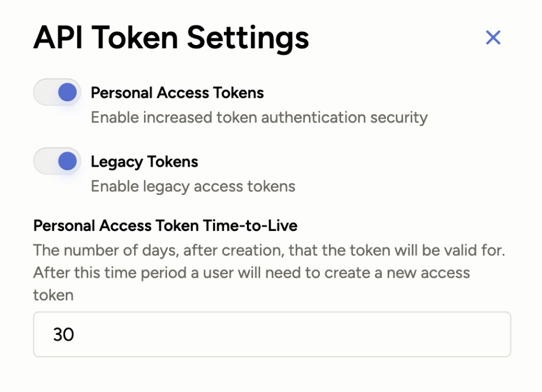Access tokens
Label Studio has personal access tokens and legacy tokens. These tokens are also referred to as your “API keys.”
| Personal Access Token | Legacy Token |
|---|---|
|
|
Find your access tokens
You can access your API keys/access tokens by clicking your user icon in the upper right and selecting Account & Settings.
If you do not see either the Personal Access Tokens or Legacy Tokens page, that means you first need to enable them for your organization.
Enable access tokens for an organization
The options that users see on their Account & Settings page depend on your settings at the organization level.
From the Organization page, select Settings > Access Token Settings.
note
The Organization page is only available to users in the Admin and Owner role.
From here you can enable and disable token types.
When a certain token type is disabled, existing tokens will not be able to authenticate to the Label Studio platform.
Use the Personal Access Token Time-to-Live to set an expiration date for personal access tokens. (Enterprise only)

“API keys” vs. “Access tokens”
In Label Studio, “access tokens” and “API keys” mean the same thing and are used interchangeably.
Personal access tokens
SDK
Personal access tokens can be set directly in the script or set as the LABEL_STUDIO_API_KEY environment variable.
# Define the URL where Label Studio is accessible and the API key for your user account
LABEL_STUDIO_URL = 'http://localhost:8080'
# API key can be either your PAT or legacy access token
LABEL_STUDIO_API_KEY = 'your-token'
# Import the SDK and the client module
from label_studio_sdk import LabelStudio
# Connect to the Label Studio API
client = LabelStudio(base_url=LABEL_STUDIO_URL, api_key=LABEL_STUDIO_API_KEY)
HTTP API
Because this is a JWT refresh token, you must use your PAT to generate a short-lived access token. This access token is then used for API authentication.
To generate this access token, make a POST request with your personal access token in the JSON body. For example:
curl -X POST <your-label-studio-url>/api/token/refresh \
-H "Content-Type: application/json" \
-d '{"refresh": "your-personal-access-token"}'In response, you will receive a JSON payload similar to:
{
"access": "your-new-access-token"
}Use this access token by including it in your API requests via the Authorization: Bearer header. For example:
curl -X <method> <Label Studio URL>/api/<endpoint> -H 'Authorization: Bearer your-new-access-token'When that access token expires (after around 5 minutes) you’ll get a 401 response, and will need to use your personal access token again to acquire a new one. This adds an extra layer of security.
You can also check when the token is set to expire using the following script:
# pip install pyjwt
from datetime import datetime, timezone
import jwt
decoded = jwt.decode(token)
exp = decoded.get("exp")
token_is_expired = (exp <= datetime.now(timezone.utc).timestamp())Legacy tokens
Generally speaking, the legacy tokens are not as secure as personal access tokens because they must be manually revoked.
SDK
There is no difference in how you use legacy tokens and personal access tokens with the Python SDK. See the example above.
HTTP API
Use this access token by including it in your API requests via the Authorization: Token header (this is different than the Authorization: Bearer header used with personal access tokens).
For example:
curl -X <method> <Label Studio URL>/api/<endpoint> -H 'Authorization: Token <token>